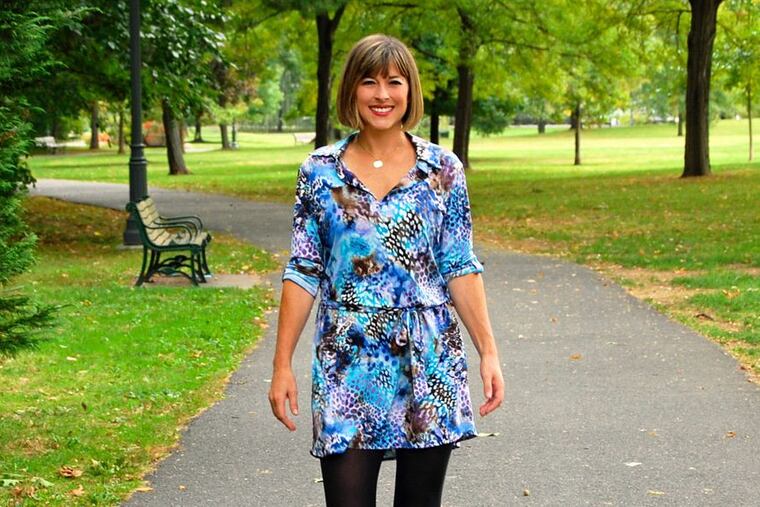Put me in, life coach! How to stop freaking out and envision your next step
A stay-at-home father, a professional body builder, and a Penn alum from 1964 all share their stories.

Evolutionary scientist Charles Darwin is often misquoted about survival.
"It's not the strongest of the species that survive, nor the most intelligent, but the one most responsive to change," Darwin actually said.
Change can be unnerving, especially for Americans in midlife or mid-career, or considering a second or even third profession (that's you, baby boomers).
At those times, a life coach can come to the rescue. Take someone such as Moss Freedman, a stay-at-home father who'd left his career as an artist for about a decade to raise children with his wife, a television executive maintaining a high-stress job.
Freedman, who recognized he "needed help," had just one coaching session before he was convinced of the merits.
"It was life-changing. I went in there incredibly intimidated at the prospect of finding work and all it entails," so he turned to Allison Task, who for years was an on-camera cooking host, cookbook author, and marketing executive. She herself wanted to change careers after having four children with her husband, so she got a coaching certificate and masters from New York University, and wrote a book about the experience, called Personal (R)evolution, out this year.
Task started coaching other friends and colleagues, and built a client base to include people such as Freedman, an artist and stay-at-home parent who wanted to become a professor.
"I talked with Allison in my coaching sessions about my goals, my vision and we articulated obstacles. We laid them out, and she guided me through getting feelings out about what was holding me back. It was very affirming, and by the way, I went in as a complete skeptic about coaching," Freedman said.
Last year, Freedman, 47, began the second career and return-to-work journey by writing to chairs of local college art departments, making connections at galleries, and building up his artist portfolio again. "I went from feeling daunted to feeling that it was practical and attainable," he said.
When Seton Hall called to him to fill in for an emergency teaching slot, Freedman was ready.
"They needed a warm body and I'd literally talked to them a week earlier," he said, and he's now an adjunct art professor there, and will be teaching again in the fall.
Coaching for Resilience, a life-coach firm based in Philadelphia, specializes in life transitions of those who are in their 40s to 60s. Founder Jan Zacharjasz left corporate life to become a certified life coach, and said, "We work with individuals to bounce back from stress, manage multiple demands, assume new roles, adapt to change, and make important decisions so they can live healthy, balanced, and purposeful lives." The move also gave her more time in her life as a member of the "sandwich generation" and caretaker of a parent with Alzheimer's disease.
Georgene Huang, who founded Fairygodboss.com, a workplace review site for women, employs life coaches to write for her website.
"Older women, in particular, face the double whammy of age and gender discrimination, especially in fields like tech or digital information. That's a source of real frustration," Huang said.
A major life transition can be made easier by getting more physically fit first — in advance of a life and career change.
Audra Anusionwu, a professional body builder, maintains her "BeautiFitStrong" studio in East Falls, and said she works "on the physical transformation side for women. I work with a 64-year-old woman who is retiring next year, and she is going to be competing in her first bodybuilding show. I also have a Navy retiree who's 53 years old trying to figure out her next step.
"I build them up physically, so they feel comfortable with transitioning. It translates into them saying 'what else can I do?' and they take that into their day to daily lives and conquer."
Sometimes coaching can come from unexpected places.
Anne Klein, who authored On the Cusp: Women of Penn '64, said she pressed her other professional friends into coaching her on how to promote her book, published in March.
Ilene Leff, a friend from the Penn 1964 graduating class, "gave me some coaching advice just yesterday. She suggested I use the word 'we' more often when asking our classmates for assistance in getting the book better known around the country," Klein said.
"We all can work together so we can sell enough books to provide a contribution to Penn from our classmates."
After realizing his second-career goal, Freedman can't say enough good things about his life-coach sessions.
"I was freaked out about how I would account for a massive amount of time away from professional life. I also 1,000 percent acknowledge that having a full-time parent at home was extraordinary for my kids," who are 10 and 11 years old, he said.
"But after coaching, I was very clear I had this goal of trying to become a college art professor. I achieved that goal, and they were proud of me, too."